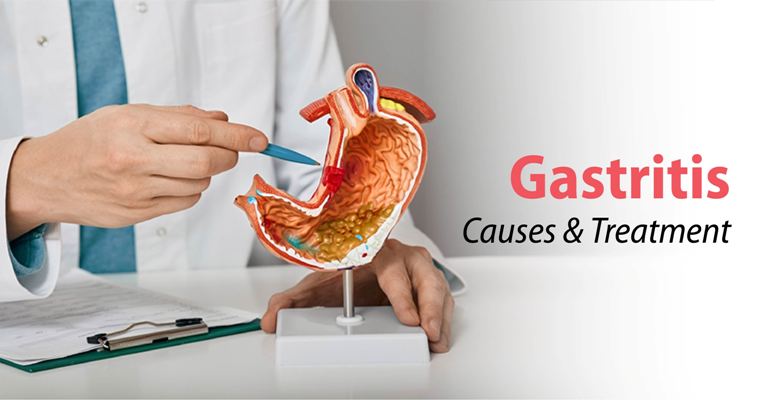Gastritis is a general term used to indicate inflammation, irritation or erosion of the stomach lining or mucosa, causing stomach aches, dyspepsia, nausea and bloating. The condition can appear suddenly (acute gastritis) or gradually (chronic gastritis). Dietary changes and medications are advised to reduce acid in the stomach and ease the symptoms.
What are the common symptoms of gastritis?
Symptoms may vary from patient to patient. Sometimes there aren’t any at all. These are some of the more common ones though:
# Burning pain in the upper abdomen, often between meals
# Nausea, vomiting
# Recurrent stomach upsets
# Appetite loss
# Feeling of fullness in upper abdomen after meals
# Hiccups
# Black stools
# Blood in vomit
What are the known causes of and risk factors for gastritis?
When the mucus-lined protective barrier to the stomach is breached due to some injury or weaknesses, digestive juices can damage and inflame the stomach lining. A clutch of diseases can raise the risk of gastritis, including inflammatory bowel diseases (IBD) like Crohn’s disease.
Some of the known risk factors include:
# Bacterial infection: While Helicobacter pylori is one of the commonest infections, it doesn’t always lead to gastritis. It is believed that the risk of this infection is often multiplied by poor lifestyle choices, including an unhealthy diet, smoking and alcohol intake.
# Pain-killer abuse: Regular use of a group of pain-relievers called NSAIDs (non-steroidal anti-inflammatory drugs) like ibuprofen, naproxen sodium, etc can lead to both acute and chronic gastritis by damaging the mucosa.
# Advancing age: Since the stomach lining tends to become progressively thinner with age, elderly individuals are more prone to H. pylori infection or autoimmune disorders.
# Excessive drinking: Since alcohol irritates and erodes the stomach lining, binge-drinking can cause acute gastritis.
# Medical stress: Any major surgical procedure, injury, burns or infections can cause severe stress, leading to acute gastritis.
# Treatment for cancer: Radiation treatment or chemotherapy for treating cancer can raise the risk of gastritis.
# Autoimmune gastritis: When your own immune system malfunctions and attacks the cells of the stomach lining, it can lead to gastritis. People with autoimmune disorders including Type 1 diabetes are more prone to this form of gastritis, which has also been linked to Vitamin B-12 deficiency.
How is gastritis diagnosed?
Following a thorough physical evaluation, these tests could be advised to diagnose gastritis:
# Upper endoscopy: To look at the stomach lining
# Blood tests: Including for H. pylori
# Fecal occult blood test: This test checks for blood in stool, a possible sign of gastritis
How is gastritis treated?
Routine treatment protocols include:
# Antacids and other medications like H-2 blockers and proton pump inhibitors (PPIs) to reduce stomach acid
# Avoiding spicy food
# Antibiotics for H. pylori infection plus heartburn medication
# Vitamin B-12 injections might be required if gastritis is precipitated by pernicious anemia
# Steering clear of foods that irritate the stomach, like lactose in milk or gluten in wheat
If gastritis is not treated and left to fester, it can lead to bleeding ulcers in the stomach. Some rare forms of chronic gastritis can also raise the risk of stomach cancer.
Medica North Bengal Clinic’s Gastro department is equipped to handle both acute and chronic gastritis under the supervision of experienced doctors.



